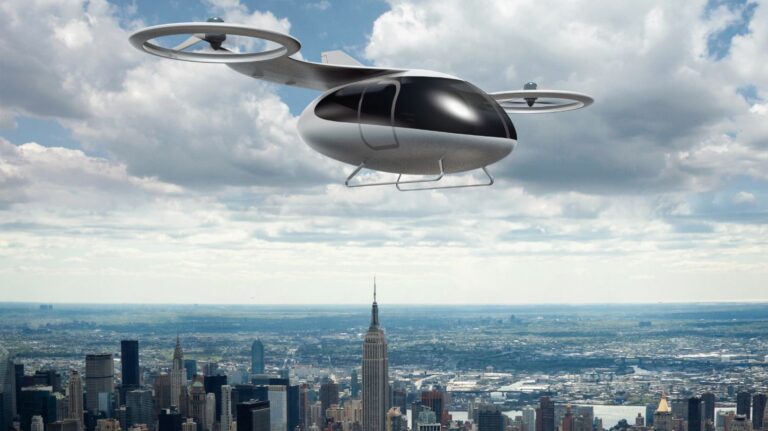Flying taxis, crime-fighting drones and critical 999 care deliveries could be a reality by 2030 according to a ‘Future of Flight’ action plan, announced by the UK Department for Transport (DfT).
Setting out a roadmap for drones and novel electric aircraft in the UK, the plan details how technology could transform British skies, with studies estimating drone technology could boost the UK economy by £45bn by the end of the decade.
It outlines plans for the first piloted flying taxi flight by 2026 and regular services by 2028, regular drone deliveries across British skies by 2027 and demos of autonomous flying taxis without pilots on board by 2030.
UK aviation and technology minister Anthony Browne said: “Cutting-edge battery technology will revolutionise transport as we know it – this plan will make sure we have the infrastructure and regulation in place to make it a reality.
“From flying taxis to emergency service drones, we’re making sure the UK is at the forefront of this dramatic shift in transportation – improving people’s lives and boosting the economy.”
WATCH: Electric air taxi completes first untethered UK flight
According to the DfT, flying taxis are currently undergoing the Civil Aviation Authority (CAA) authorisation process and have been made possible following rapid advances in battery technology, meaning they are light enough to stay in the air and powerful enough to cover distances needed.
First imagined in the ‘Flightpath to the Future’ in 2022, the joint action plan between industry and government sets out the strategic direction of the sector over the next five years, including innovation, security, safety and cutting emissions.
West Midlands Police has used drones to tackle violent crime and antisocial behaviour, while the technology has also been used to help frontline NHS staff save lives and investigated by private sector companies seeking to improve cost efficiency in their supply chains.
For six months between October 2022 and March 2023, UK drone service provider Skyfarer partnered with University Hospitals Coventry and Warwickshire NHS Trust and Medical Logistics UK to test drones to deliver surgical implants and pathology samples between sites.
In one case, drones helped reduce delivery times of surgical implants between Coventry and Rugby hospitals from up to an hour to 18 minutes – a 70% decrease.
READ MORE: Aviant launches last-mile drone delivery service in Norway
The Future of Flight action plan contains measures designed to make drone applications and assessments easier by creating digital platforms that operators can use – ensuring companies and public services get drones up and flying quicker.
It will also enable the development of vertiports – mini-airports for drones and electric aircraft that take off vertically – by developing certification standards and reviewing the use of existing infrastructure to deliver at speed, boost safety and security.
Industry partners will also undertake multiple trials to explore new ways to operate drones beyond the visual line of sight and demonstrate electric aircraft.
According to the DfT, this could include finding and repairing faults quicker on railways with fewer delays and cancellations for train passengers, providing new connections across the UK and using technology to help emergency services.
The Future of Flight action plan comes ahead of the fifth meeting of the Future of Flight Industry Group, a joint force established in February 2023 for government and industry leaders to tackle the challenges facing the sector and set goals as emerging aviation technologies become more commonplace.
Achievements and innovations in urban air mobility will be celebrated at the third annual CiTTi Awards, which will be held on 26 November 2024 at De Vere Grand Connaught Rooms in London. Nominations are open now! Please visit www.cittiawards.co.uk to learn more about this unmissable event for the UK’s transportation sector.





